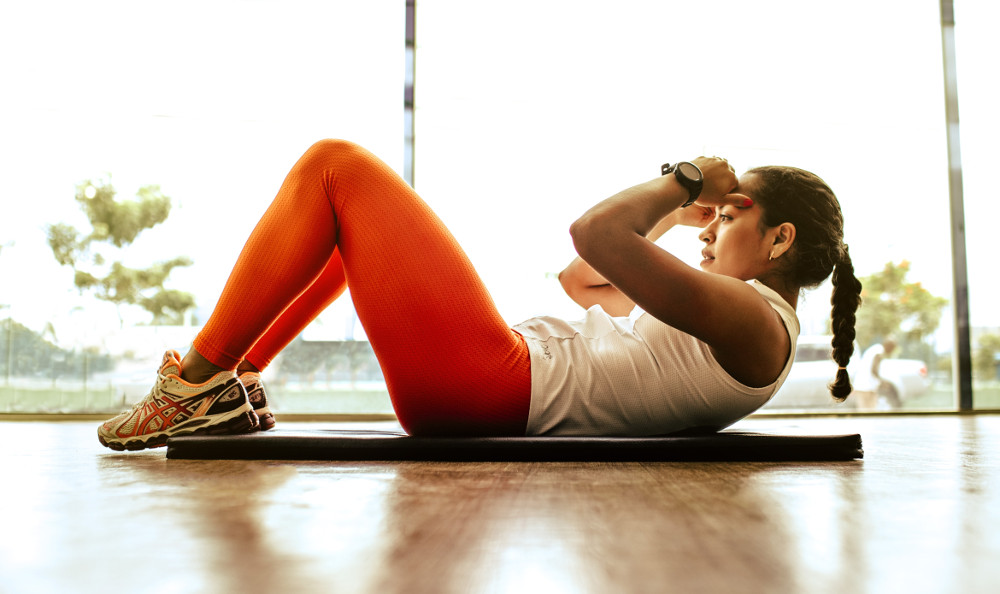
How to stay fit and healthy
Some simple steps that can really enhance your wellbeing while we’re in the current crisis
The latest measures by the government to help control the spread of coronavirus are leaving many of us worried about what it will mean for our health and wellbeing. But there are plenty of ways to maintain your physical and mental health while inside.
Workout at home
Who needs a crowded gym when you can exercise from the comfort of your own home?
“Be creative,” says fitness coach Elliott Upton. “Household furniture, like a sofa or footstool, can be incorporated into your workouts and are versatile to use with a number of exercises, including: split squats, triceps dips, press ups, planks, box squats and more. If you have a flight of stairs in your home, this can be useful for exercises like step-ups, ‘box jumps’, planks, press-ups and evening sprints.”
In general, a full-body bodyweight workout (strength training exercises that use the individual’s own weight to provide resistance against gravity) is likely to be most effective, especially if you’re lacking space and gym equipment. “Bodyweight workouts are great for beginners, as they are relatively safe to perform for anyone who has never lifted weights before. They can be scaled up and progressed to any ability level to keep the workouts challenging,” says Elliott. He recommends the following:
- Squat
- Push-Up
- Walking Lunge (each leg)
- Plank Rotation (each side)
- Split squat (each leg)
- V-Sit
- 10 reps each (beginner)
- 15 reps each (intermediate)
- 20+ reps each (advanced)
Maintain a routine
Never underestimate the benefits of a routine. While it might sound boring, structuring your daily tasks and activities around set times can be of great benefit to your mental health, while having a schedule offers the comfort of certainty.
“Take breaks from work just like you would normally,” says Dr Iain Jordan, Consultant in Psychological Medicine in the NHS and Chief Scientist at Wakey, a new breakfast alarm show that provides tips on wellness. “It will be difficult to maintain a regular schedule and regular sleep. These will remain crucial though for good physical and mental health. Get up at the same time everyday — yes even on days off. Go to bed when you’re tired. Cultivate a sleep routine,” says Dr Iain.
Go for a walk
Currently (24 March), we’re still able to go for walks (with some restrictions) so do get some fresh air. If you’re self-isolating, however, and can’t go out, then you can still try to keep your steps up. According to the NHS website, even a 10-minute walk can clear your mind and help you relax, so it’s well worth finding an alternative way to get up your step count.
If you have a garden, do a few laps around it while on the phone to your friends. Take breaks throughout the day to walk up and down the stairs, or simply march on the spot while waiting for the kettle to boil. “Try and get out of breath for 20–30 minutes every day. Encourage — when not working — enjoyable and meaningful activity. This is also a great way to empower people, and to distract attention away from worry,” says Dr Iain.
Be mindful
Mindfulness is the practice of bringing your attention to the present moment, which can help to reduce anxiety, improve cognition and even help the brain to focus better.
You can practice mindfulness in a number of different ways, including breathing exercises or yoga, which is easy to do at home thanks to YouTube channels such as Yoga With Adriene. If you don’t already own a yoga mat you could use a towel instead. Find a room that is quiet and empty to practice in. Not only will you feel calmer afterwards, but yoga also helps you to stretch your body and relieve muscle tension.
Apps such as Calm and Headspace can also help with mindfulness, easing the mind into a state of present awareness and greater relaxation.
“The most concerning mental health consequence of this crisis is going to be a result of those who can’t support themselves and their families when they’re out of work. If you are in a position to do so — consider what your role is in your community and broader society,” says Dr Iain. “When you find yourself worrying, ask yourself: Is there anything I can do about this now? If not then try to bring attention elsewhere.
Eat well
If you can, fill the freezer with frozen fruit and vegetables to ensure you’re getting essential nutrients that won’t go off if you’re stuck at home and unable to get to the shops for a while. Look out for foods that are fortified with vitamin D, also, which we get primarily from the sunshine and helps our teeth and bones to stay strong.
Staying hydrated is key, with official NHS guidelines stating that we should each be drinking six to eight glasses of water a day — about 1.2 litres.
Phone a friend
If you live alone or are self-isolating, it’s more important than ever to remain in touch with others over the phone or via video chat services such as Skype and FaceTime. This can help you to feel more connected to the outside world, even if you’re staying inside, and also alleviate anxieties you’re feeling about the current coronavirus situation. “Connection is crucial for everyone. Encourage people to maintain regular check-ins — over the phone or video-call if necessary,” says Dr Iain.
Try a fitness app
Dame Jessica Ennis-Hill’s fitness app Jennis is specifically designed for people to do at home – all exercises are under 30mins and require minimal equipment, perfect for those who are missing the gym and group classes (instead, you get to workout with an Olympian in your living room!)
And some quick motivation tips from Jessica…
Make sure to carve out some ‘me time’: It can be so easy when you’re at home to feel de-motivated about exercise and to put it off, giving in to all sorts of distractions.
-
- Set aside some time and stick to it – even 5 minute bursts can not only make you feel great but cumulatively can make a real difference to your overall fitness and wellbeing
- If you’re home with family and friends, get them involved – it’s easier to stick to when you’re not alone
Focus on how great you’ll feel afterwards
-
- Don’t focus on the effort, focus on releasing those endorphins and boosting your mood
- Exercise is a great way to get the happy hormone flowing and if you must stay at home, getting some exercise in is a sure fire way to give you a little boost
Set Goals & Track Progress
-
- Being at home is a great way to actually have the time to stick to your fitness goals and monitor how you improve – a lot can change in two weeks in terms of your fitness!





